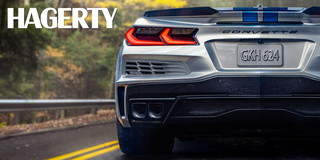
Hybrids and EVs are coming fast in motorsports, both literally and figuratively. Case in point, the 2019 Tire Rack SCCA® Solo National Championships saw an EV lay claim to a National Championship title for the first time when David Marcus drove his Tesla Model 3 Performance to the B Street win. It’s not just EVs, either. That same year, Erik Strelnieks put nearly a second on the Super Street field in his hybrid-powered Acura NSX, with Tom O’Gorman repeating the feat in a similar hybrid NSX during the 2021 Solo Nationals. On the racetrack, the hybrid Acura NSX is classed in SCCA Road Racing’s GT-2, and it’s not abnormal to see a Tesla on track during Tire Rack SCCA Time Trials National Tour Powered by Hagerty weekends or SCCA Track Night in America® Driven by Tire Rack events. Considering the National Automobile Dealers Association recently stated that hybrids, plug-ins, and full-electric vehicles accounted for 12.3 percent of new vehicles sold in 2022 – an increase of 2.7 percent over the prior year – people will likely see more battery-powered vehicles at motorsports events in the future. While growing in popularity, the lithium-ion battery technology that powers hybrids and EVs is relatively new, which is causing some apprehension in the motorsports market – a topic Hagerty Motorsports, an SCCA partner, recently tackled head on.
Article author Steven Cole Smith begins the story by telling the tale of three racetracks. Atlanta Motorsports Park, he says, is embracing electrified vehicles. “Electric vehicles are the future of racing,” Jeremy Porter, AMP owner and CEO, is quoted as saying in the article. AMP currently has five DC Level 3 chargers installed on the premises. According to the article, the opposite side of the coin includes Summit Point Motorsports Park and Carolina Motorsports Park. Summit Point has put a “tactical pause” on electric and hybrid vehicles on its track, with CMP adopting a “no electric vehicles allowed on track” policy.
Much of the concern regarding vehicles carrying lithium-ion batteries is fire related, where thermal runaway in the large battery packs can create a fire that can burn for hours or days if left untreated. How to extinguish the fire is still a question to some, leaving some facilities unsure of how to treat the technology.
In the article, Smith speaks with SCCA’s Senior Director of Rally/Solo and Experiential Programs, Heyward Wagner:
"Are Summit Point and Carolina Motorsports Park outliers? Probably not. “It’s too early to call anyone an outlier,” says Heyward Wagner, director of experiential programs for the 51,000-member Sports Car Club of America. He is in charge of the SCCA’s Track Night in America, the program for which the club rents out a facility and lets enthusiasts drive their cars on track, typically for about $150. Wagner has Track Nights at about 30 tracks in the U.S., and so far, three tracks have told him they don’t want battery-powered cars.
Owners of cars like the Ford Mustang Mach-E or the track-ready, 1020-horsepower Tesla Plaid can’t participate. Under such restrictions, neither could supercars like the Porsche 918 Spyder or McLaren Artura. “Everybody is learning right now,” Wagner says. “We do have tracks that have told us that electrified vehicles are not welcome, and a track where they asked owners of electrified vehicles to sign a unique waiver.”
It’s a problem, Wagner says. “What is known is that an electrified vehicle fire is a different animal than an internal combustion engine fire. Nobody debates that. It requires different equipment, it requires different training, and that represents an investment for a track to make to be future-forward.”
Read more about this complex issue by clicking the button below.
Photo courtesy Chevlrolet







